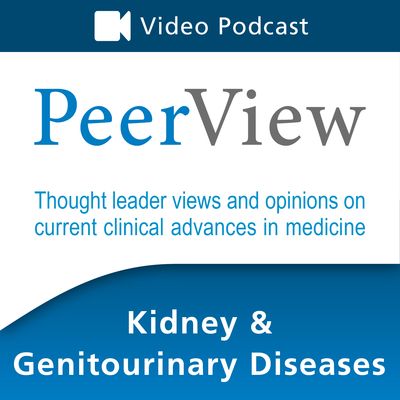PeerView (PVI) is a leading provider of high-quality, innovative continuing education (CME/CE/CPE and MOC) for clinicians and their interprofessional teams. Combining evidence-based medicine and instructional expertise, PeerView activities improve the knowledge, skills, and strategies that support clinical performance and patient outcomes. PeerView makes its educational programming and expert-led presentations and symposia available through its network of popular podcast channels to support specific specialties and conditions. Each episode includes a link to request CME/CE credit for participation. PeerView is solely responsible for the selection of topics, the preparation of editorial content, and the distribution of all materials it publishes.
http://ww2.peerview.com
George L. Bakris, MD / Joanna Hudson, PharmD, BCPS, FASN, FCCP, FNKF - Advancing the Standard of Care for Patients with Hyperkalemia: Insights and Evidence for Clinical Pharmacy Practice
Go online to PeerView.com/YVS860 to view the activity, download slides and practice aids, and complete the post-test to earn credit. Hyperkalemia is a potentially life-threatening condition caused by the inability of the kidneys to excrete potassium sufficiently. Excessive potassium levels can lead to cardiac arrhythmias and sudden cardiac death. Hyperkalemia is often encountered in hospitalized patients and frequently recurs after discharge. The problem is further complicated by the fact that guideline-directed medical therapies frequently used to reduce cardiorenal risks in patients with heart failure (HF) or chronic kidney disease (CKD) can increase the risk of hyperkalemia. Newer potassium binders may allow these patients to better tolerate guideline-directed therapies, as well as reduce the risk of hyperkalemia recurrence. Interprofessional models of care, such as those involving the pharmacist in transition-of-care interventions, have also been shown to improve patient outcomes. In this activity, based on a recent live web broadcast, an interprofessional expert panel examines the diagnostic thresholds for hyperkalemia, the factors that contribute to its risk in patients with HF, CKD, or diabetes, and the associations between hyperkalemia and poor patient outcomes. The experts also explore the latest evidence for modern potassium binders, share evidence-based strategies for integrating these agents into patient-centered treatment plans, and consider how interprofessional approaches to care can improve patient outcomes and potentially reduce readmission rates. Upon completion of this CE activity, participants will be able to: Recognize thresholds for mild, moderate, and severe hyperkalemia and their implications for recurrent hospital admissions and mortality, Describe the burden of hyperkalemia in patients with HF and CKD and its association with renin-angiotensin-aldosterone system (RAAS) inhibitors, Differentiate agents for managing hyperkalemia according to their mechanisms of action, indications, and pharmacologic characteristics, Apply evidence-based strategies to manage hyperkalemia, optimize care transitions, and potentially reduce hyperkalemia-related hospital readmissions in patients with HF or CKD.
